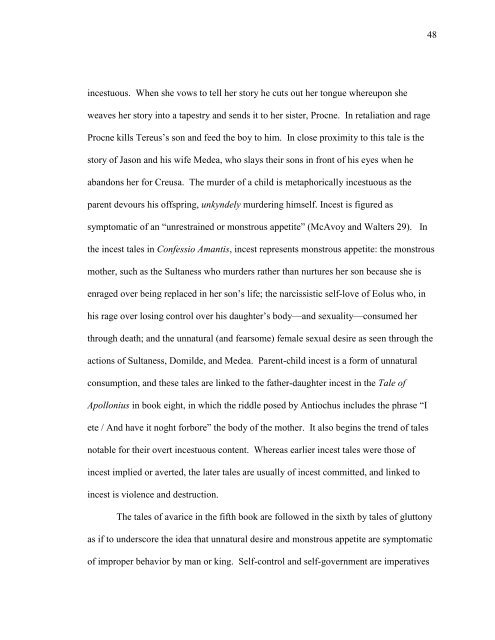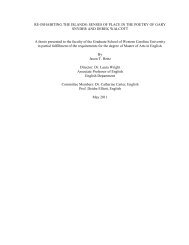SUMMERS, KAREN CRADY, Ph.D. Reading Incest - The University ...
SUMMERS, KAREN CRADY, Ph.D. Reading Incest - The University ...
SUMMERS, KAREN CRADY, Ph.D. Reading Incest - The University ...
You also want an ePaper? Increase the reach of your titles
YUMPU automatically turns print PDFs into web optimized ePapers that Google loves.
48<br />
incestuous. When she vows to tell her story he cuts out her tongue whereupon she<br />
weaves her story into a tapestry and sends it to her sister, Procne. In retaliation and rage<br />
Procne kills Tereus’s son and feed the boy to him. In close proximity to this tale is the<br />
story of Jason and his wife Medea, who slays their sons in front of his eyes when he<br />
abandons her for Creusa. <strong>The</strong> murder of a child is metaphorically incestuous as the<br />
parent devours his offspring, unkyndely murdering himself. <strong>Incest</strong> is figured as<br />
symptomatic of an “unrestrained or monstrous appetite” (McAvoy and Walters 29). In<br />
the incest tales in Confessio Amantis, incest represents monstrous appetite: the monstrous<br />
mother, such as the Sultaness who murders rather than nurtures her son because she is<br />
enraged over being replaced in her son’s life; the narcissistic self-love of Eolus who, in<br />
his rage over losing control over his daughter’s body—and sexuality—consumed her<br />
through death; and the unnatural (and fearsome) female sexual desire as seen through the<br />
actions of Sultaness, Domilde, and Medea. Parent-child incest is a form of unnatural<br />
consumption, and these tales are linked to the father-daughter incest in the Tale of<br />
Apollonius in book eight, in which the riddle posed by Antiochus includes the phrase “I<br />
ete / And have it noght forbore” the body of the mother. It also begins the trend of tales<br />
notable for their overt incestuous content. Whereas earlier incest tales were those of<br />
incest implied or averted, the later tales are usually of incest committed, and linked to<br />
incest is violence and destruction.<br />
<strong>The</strong> tales of avarice in the fifth book are followed in the sixth by tales of gluttony<br />
as if to underscore the idea that unnatural desire and monstrous appetite are symptomatic<br />
of improper behavior by man or king. Self-control and self-government are imperatives
















